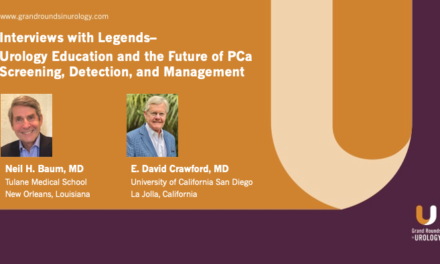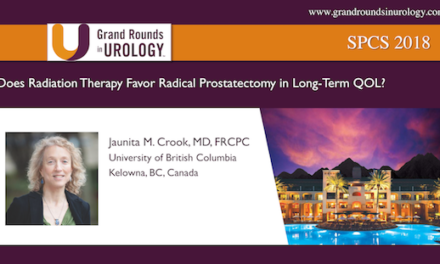Daniel P. Petrylak, MD presented “PARP in mCRPC” during the 35th International Prostate Cancer Update conference on February 9, 2025, in Vail, Colorado.
This content is available free to the GRU Community. Login or create an account to view it.
How to cite: Petrylak, Daniel P. “PARP in mCRPC.” February 9, 2025. Accessed Jun 2025. https://grandroundsinurology.com/parp-in-mcrpc/
PARP in mCRPC – Summary
Daniel P. Petrylak, MD, Professor of Medicine (Medical Oncology) and of Urology, and Chief of Genitourinary Oncology at the Smilow Cancer Hospital, Yale University Cancer Center, New Haven, Connecticut focuses on the role of PARP inhibitors in managing prostate cancer. In this 14-minute presentation, Dr. Petrylak concentrates on patients with DNA repair deficiencies.
Dr. Petrylak outlines the significance of homologous recombination deficiency (HRD) in prostate cancer cells, making them sensitive to PARP inhibition through synthetic lethality. He emphasizes the four available PARP inhibitors and their distinct mechanisms, such as catalytic inhibition and DNA trapping, which induce apoptosis in cancer cells. Approximately 25% of metastatic castration-resistant prostate cancers exhibit DNA repair gene alterations, making them potential candidates for PARP inhibitors.
Petrylak notes that rucaparib and olaparib have FDA approvals, with specific indications for BRCA-mutated or HRD-positive patients, often following progression on therapies like enzalutamide or abiraterone. The TRITON3 trial demonstrates improved progression-free survival with rucaparib in BRCA-mutated patients but shows limited efficacy in those with ATM mutations.
Combination strategies, such as pairing niraparib with abiraterone, are explored to potentially enhance sensitivity in non-HRD patients. Dr. Petrylak also discusses emerging data on sequencing PARP inhibitors, emphasizing their potential role before cytotoxic therapies in patients with BRCA mutations. Ongoing trials continue to investigate PARP combinations in earlier disease states and hormone-sensitive settings, which may further refine treatment strategies.
About the 35th International Prostate Cancer Update:
The International Prostate Cancer Update (IPCU), is a multi-day, CME-accredited conference focused on new developments in prostate cancer treatment, diagnosis, and prevention. IPCU 35 will feature lectures, interactive discussions, panel roundtables, debates, and case reports. This conference is led by expert physicians and is designed for urologists, medical oncologists, radiation oncologists, and other healthcare professionals involved in the diagnosis and treatment of prostate cancer.
The goal of this educational program is to equip healthcare professionals involved in the diagnosis and treatment of prostate cancer with the up-to-date clinical knowledge and tools they need to best treat their patients. The program will discuss the treatment of prostate cancer from diagnosis to treating advanced and metastatic disease. The conference aims to give physicians exposure to a comprehensive review of treating prostate cancer patients and to give them a chance to discuss the issues with peers and experts. You can learn more about the conference here.
ABOUT THE AUTHOR
Daniel P. Petrylak, MD, leads the genitourinary cancers medical oncology team at Smilow Cancer Hospital as director of the genitourinary cancer research group, professor, and co-director of the Cancer Signaling Network program. Dr. Petrylak joined Yale from Herbert Irving Cancer Center at Columbia University Medical Center with New York-Presbyterian Hospital, where he served as Professor of Medicine (Medical Oncology) and Urology and began his appointment in September of 2012. After serving for more than 20 years as the advanced bladder chair for SWOG, Dr. Petrylak is now the Vice Chair of the Genitourinary Committee.





